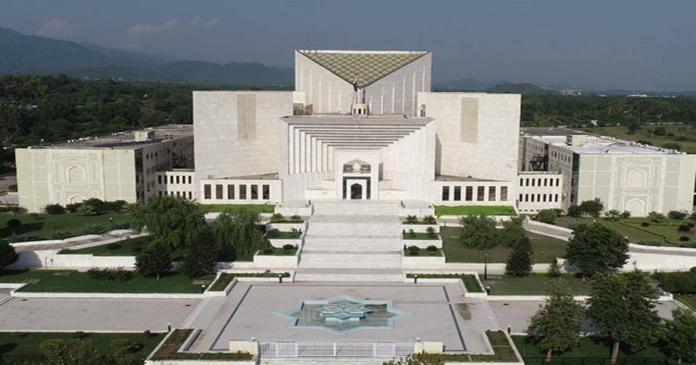The hearing of a series of petitions against the prosecution of civilians in military courts by a six-member Supreme Court (SC) has resumed.
SC resumes hearing against military trials: The bench consists of Chief Justice of Pakistan (CJP) Umar Ata Bandial, Justices Ayesha A. Malik, Ijazul Ahsan, Munib Akhtar, Yahya Afridi, and Sayyed Mazahar Ali Akbar Naqvi.
The federal administration had already informed the SC that convictions for the May 9 violence would not result in the death penalty, but it had asked for more time to consider giving a substantive right of appeal against verdicts made by military courts.
Attorney General for Pakistan Mansoor Usman Awan had previously informed the bench that the matter “requires careful consideration in light of serious implications for having a direct bearing on cases like that of Indian spy Kulbhushan Jadhav or individuals held under the charge of espionage [and] declared enemy of the state.”
“Supreme Court Session: Petition for Full Court Hearing on Military Trials of Civilians”
The CJP noted that senior lawyer Faisal Siddiqi had petitioned court a day earlier seeking the formation of a full court to hear the argument against military trials of civilians at the beginning of today’s session.
The bench would first hear the arguments made by the attorney for former Chief Justice of Pakistan Jawwad S. Khawaja, according to Justice Bandial.
“My client is the former chief justice of Pakistan,” claimed attorney Khwaja Hussain Ahmed. “My client requests that I be treated by the court as an ordinary citizen and not as a unique case. He wants the title “ex-chief justice” dropped from his name.
Justice Bandial stated that the former chief justice was a well-known figure and that his plea was “non-political” in this instance.
The chief justice of the Supreme Court once inquired as to whether Faisal Siddiqi was hiding, to which he was informed that the lawyer had left the courtroom to complete some business and would soon return.
Justice Naqvi questioned why the investigation [against civilians] was not made public as the hearing went on, stating that the law did not permit “pick and choose.”
The cries
Former Chief Justice of Pakistan Jawwad S. Khawaja, Aitzaz Ahsan, Karamat Ali, and PTI Chairman Imran Khan submitted the petitions.
Advocate Khawaja Ahmad submitted the petition on behalf of Khawaja, asking the Supreme Court to deem it unlawful for civilians to be tried in military courts.
The former CJP argued that the Pakistan Army Act’s Sections 2(1)(d)(i) and (ii) were invalid since they contradicted the fundamental rights guaranteed by the Constitution, and he advocated for their repeal.
The petitioners demanded that any military court should prohibit making a final decision in any case against a civilian based on the sections as a temporary measure, and they requested the suspension of any proceedings against civilians based on the sections.
Through their attorney Faisal Siddiqi, five members of civil society from various cities requested that the trial of civilians in military courts concerning the May 9 countrywide violence be declared unlawful before this petition.
Similarly, Ahsan, a former law minister who also led the 2007 lawyers’ movement, expressed that the primary goal of his petition was to prevent military courts from trying any of the thousands of civilians who have been admittedly detained on suspicion of involvement in the May 9 violence.
The petitioner stated that he was not attempting to prevent any citizen from being tried in a legally formed criminal court.
However, The PTI chairman appealed for a declaration to be made against the Pakistan Army Act (PAA) of 1952 and the Official Secrets Act of 1923.

